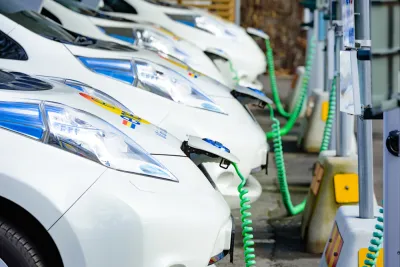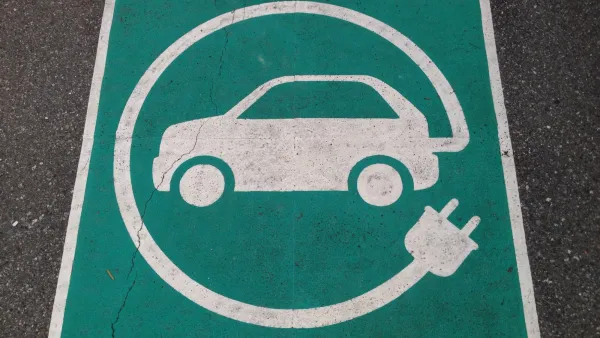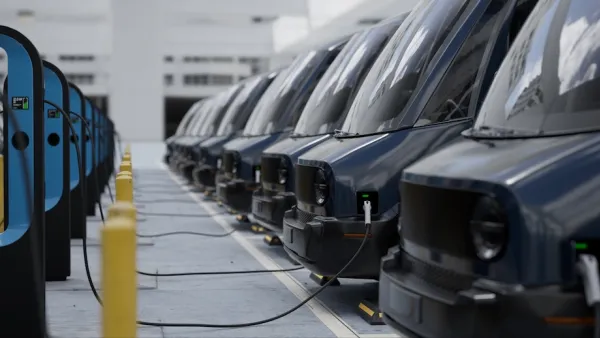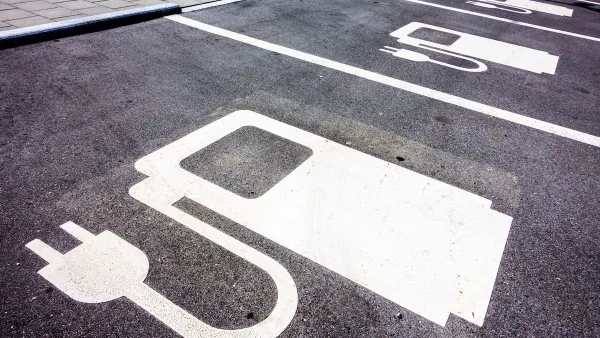Shifting municipal fleets to electric vehicles poses some challenges, but cities can take steps today to prepare for an easier transition to an electric future.

While many cities have pledged to electrify their municipal fleets—including police cars, transit buses, street sweepers, and other vehicles—meeting their goals may be difficult due to a number of factors. As Sharon O'Malley writes on Route Fifty, in additions to concerns about up-front costs (an electric Ford pick-up, for example, costs around $10,000 more than the gas-powered version), "some fleet managers have complained that electric vehicle technology has lagged behind their eagerness to bring electric-powered heavy-duty trucks and equipment on board." City leaders worry that electric heavy machinery like snowplows won't function as effectively or require too much time to recharge.
Some cities, like Portland, Oregon, which has committed to a fully electric city fleet by 2050, have found ways to save costs on charging infrastructure. "To prepare, the city struck a subscription-type deal with a vendor of charging stations so it pays monthly to plug in its cars and trucks rather than laying out the capital to build the stations itself. In turn, it uses its savings on fuel to help pay for charging, making it an operating cost rather than a capital expense."
O'Malley writes that experts advise cities to make strategic decisions to decarbonize their fleets most efficiently, like replacing the cars and trucks that rack up the most miles, which will save more money on fuel. Alan Bates, fleet business operations manager for Portland, says departments like parking enforcement offer "low-hanging fruit" for electrification, offering Portland's three-wheel parking enforcement scooters as an example. "They’re not driving a ton of miles, they’re stop and go, they easily get enough charge every night to come back in the morning and run their routes." Others encourage cities to at least give electric vehicles a test drive in order to "demystify the process" and win over EV skeptics.
FULL STORY: Why Fully Transitioning Municipal Fleets to Electric Vehicles Isn't Easy

Analysis: Cybertruck Fatality Rate Far Exceeds That of Ford Pinto
The Tesla Cybertruck was recalled seven times last year.

National Parks Layoffs Will Cause Communities to Lose Billions
Thousands of essential park workers were laid off this week, just before the busy spring break season.

Retro-silient?: America’s First “Eco-burb,” The Woodlands Turns 50
A master-planned community north of Houston offers lessons on green infrastructure and resilient design, but falls short of its founder’s lofty affordability and walkability goals.

Test News Post 1
This is a summary

Analysis: Cybertruck Fatality Rate Far Exceeds That of Ford Pinto
The Tesla Cybertruck was recalled seven times last year.

Test News Headline 46
Test for the image on the front page.
Urban Design for Planners 1: Software Tools
This six-course series explores essential urban design concepts using open source software and equips planners with the tools they need to participate fully in the urban design process.
Planning for Universal Design
Learn the tools for implementing Universal Design in planning regulations.
EMC Planning Group, Inc.
Planetizen
Planetizen
Mpact (formerly Rail~Volution)
Great Falls Development Authority, Inc.
HUDs Office of Policy Development and Research
NYU Wagner Graduate School of Public Service




























